The festival of Carnevale, known as Carnival or Mardi Gras in English, takes place in February or early March in Italy. A time of festivities, parades, parties and entertainment, it can be considered the big celebration before the fasting of Lent and the pious restrictions of Easter.
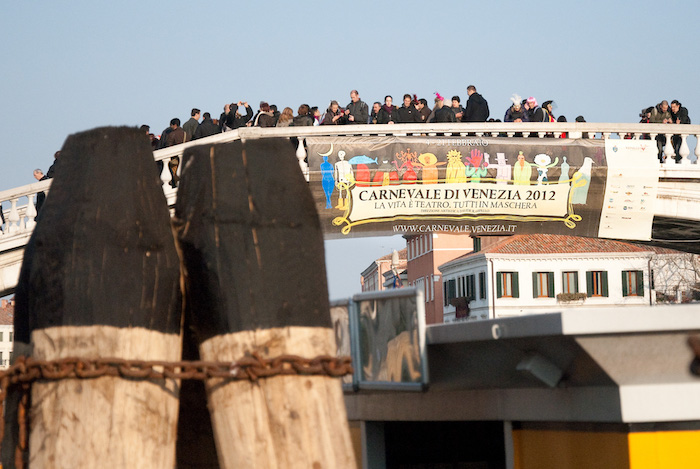
The most well-known Carnival celebrations take place in Venezia, Viareggio, Ivrea and Cento but celebrations on a smaller scale occur in most towns and cities across Italy. Regardless of where you decide to celebrate this year, the following Carnival vocabulary is bound to come in handy! 🙂
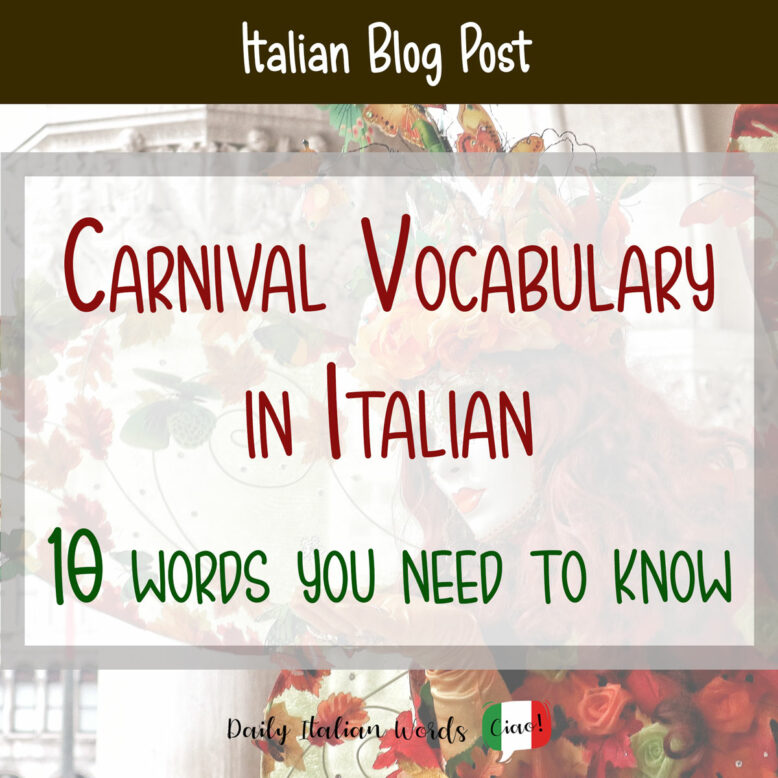
1. Maschera
English meaning: mask
Plural: maschere
Although maschere are a fixture of all Carnevale celebrations in Italy, they are most closely associated with the Venetian carnival tradition. Up until the 18th century, people would wear masks to disguise their identity and social status, allowing them to interact more freely with other members of society and engage in romantic encounters or criminal activities without being recognised. Today they are bought and sold as decorations or accessories to Carnival costumes worn at masquerade balls or public events such as the Carnevale di Venezia.
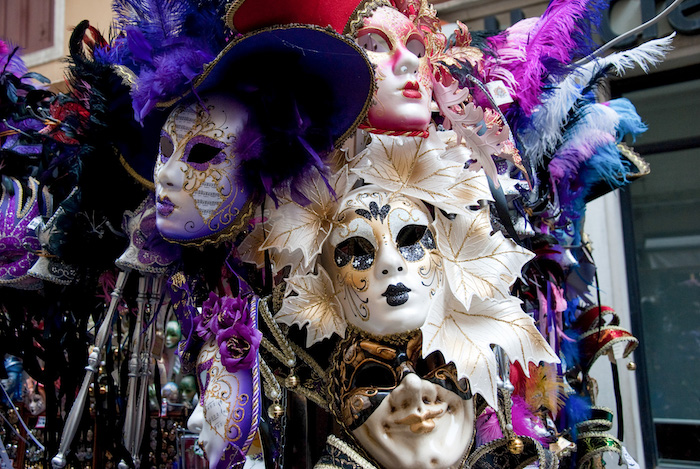
These masks, usually based on characters from La Commedia d’Arte, can be full-face masks or eye masks. Some of the most famous include:
- Bauta: covers the whole face, strong jaw line, no mouth, lots of gilding
- Colombina: half mask, decorated with bright colours and feathers
- Medico della Peste: traditionally used by doctors to filter the germ laden air during periods of plague
- Volto: traditionally a white half-mask attached to a tricorn hat, today they are full-faced masks with elaborate decorations, also known as Larva
- Arlecchino: the jolly or jester, includes points with bells
- Pulcinella: a black or dark brown mask with a long nose
2. Costume
English meaning: costume
Plural: costumi
During Carnevale, kids and adults alike love to dress up in costumi. In addition to the more traditional costumes and masks mentioned above, many people choose to dress up as their favourite TV character or superhero.
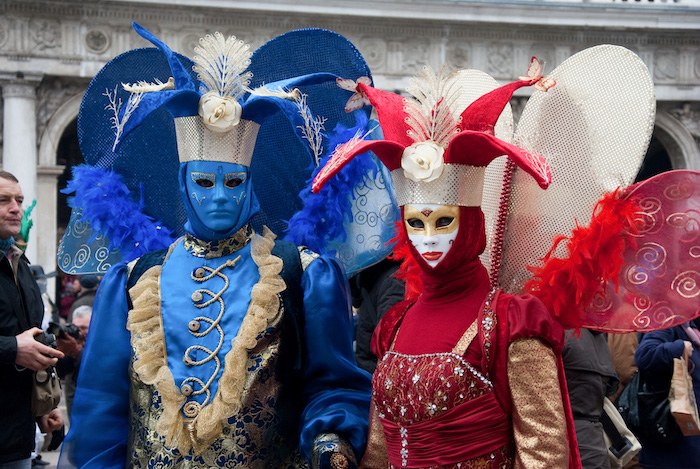
3. Coriandoli
English meaning: confetti
Singular: coriandolo
Despite being an Italian word, confetti doesn’t actually refer to the small coloured bit of paper traditionally thrown in the air during Carnival. The correct term for this party accessory is coriandoli!
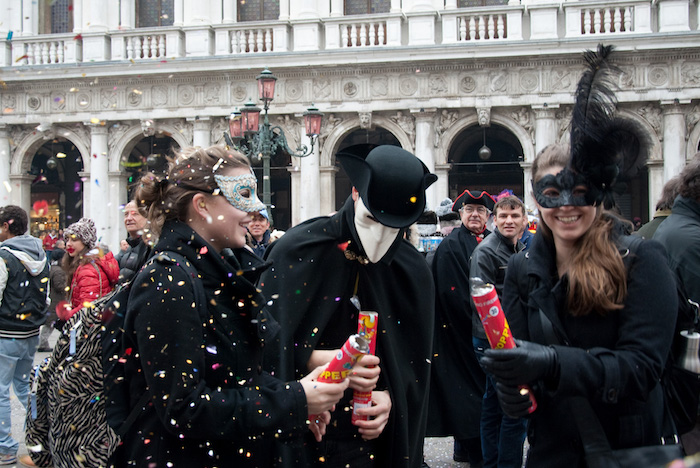
So what are confetti in Italian? This word actually refers to the sugar-covered almonds given out at weddings and christenings.
4. Carro allegorico
English meaning: allegorical float
Plural: carri allegorici
A central element of all Carnival parades is the carri allegorici, elaborate floats made from paper mâché (cartapesta). Traditionally they consisted of allegorical figures sat on a throne but today many are satirical in nature, representing current events and politics.
Some of the most elaborate floats can be seen at the Viareggio Carnival celebrations, which take place on the Sunday before Shrove Tuesday, as well as the three Sundays before and the two weekends following.
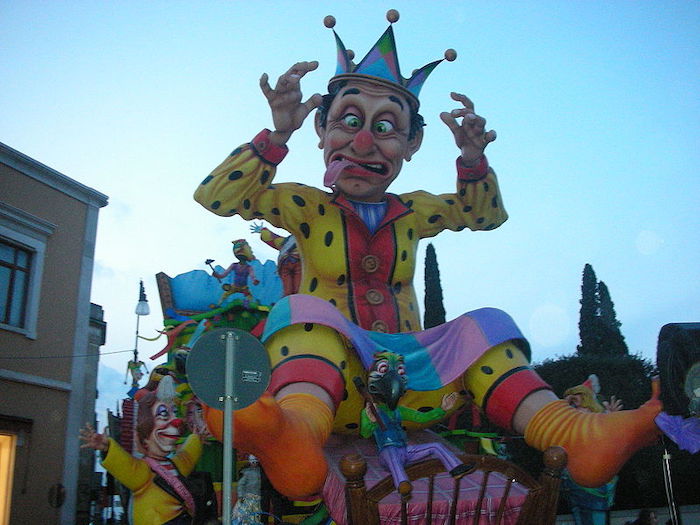
5. Sfilata
English meaning: parade
Plural: sfilate
Most cities across Italy hold a sfilata during Carnival but one of the most famous is undoubtably the Historical Carnival Parade of Ivrea. It culminates in the Battle of the Oranges (la Battaglia delle Arancie) where teams of orange handlers (called aranceri in Italian) throw oranges against aranceri riding in carts.
The battle commemorates the city’s defiance against a 12th or 13th century tyrant who attempted to rape the miller’s daughter Violetta on her wedding night. Not one to be trifled with, she instead decapitates him, after which populace storms the palace.
6. Trombetta
English meaning: party horn
Plural: trombette
The trombetta is a kind of party horn or noisemaker often used during Carnvial. It literally translates as little trumpet. The most popular kind is the lingua di Menelik, also known as lingua di Menelicche, which is formed from a paper tube that unrolls and makes a noise when blown into. The tutorial below teaches you how to make your own!
7. Stelle filanti
English meaning: serpentine streamers
Singular: stella filante
Stelle filanti are another very popular party accessory consisting of long, snake-like strips of paper, usually wound up in the roll. The term consists of two words: stelle (stars) and filanti (stringy).
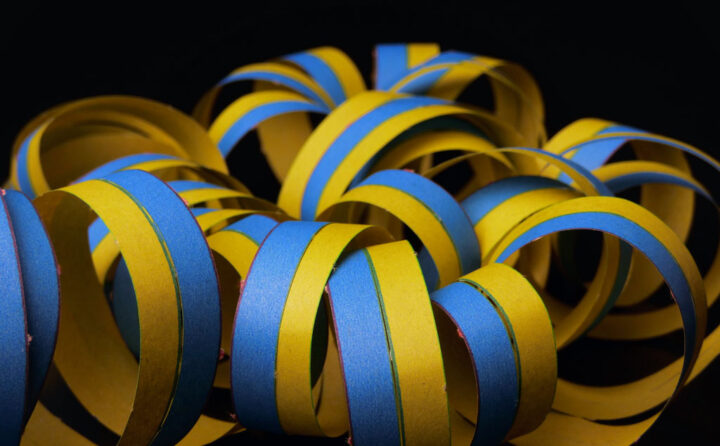
8. Chiacchiere
English meaning: a traditional Italian sweet
Singular: chiacchiera
Chiacchiere literally means chats or conversations in Italian but in the context of Carnival, it refers to the typical Italian sweet made of flour, sugar, butter, eggs and an alcoholic component such as brandy or grappa. To create a crispy texture, they are either fried or cooked in the oven, after which they are sprinkled with icing sugar.
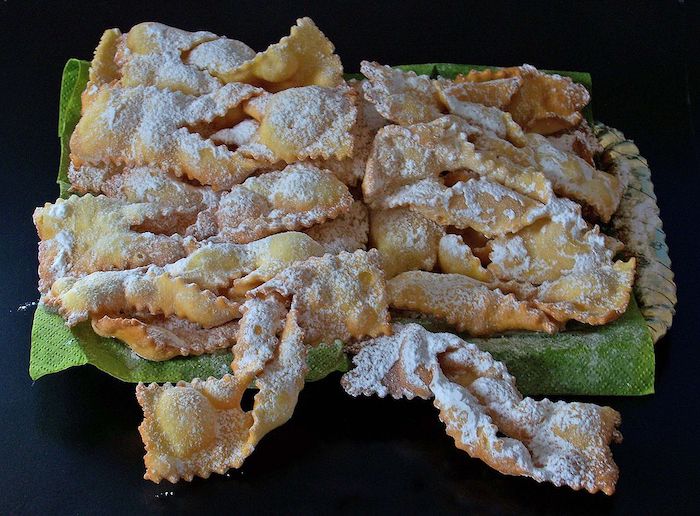
Chiacchiere are known by different names across the country such as, for example, bugie in Piemonte, crostoli in Veneto and frappole in Tuscany.
9. Scherzo
English meaning: prank
Plural: scherzi
In Italian, there is the tradition of engaging in childish pranks and mischievous behaviour during Carnival. This is where the popular saying: A Carnevale ogni scherzo vale! (At Carnival, anything goes!) comes from!
10. Carnevale
English meaning: Carnival
Plural: Carnevali
Let’s end this article with the name of the festival itself. It is thought that the word originates from the Latin expression ‘carnem levare‘ meaning to remove meat – a reference to the period of fasting during Lent. Over time, this became Carne, vale! (Meat, goodbye!).
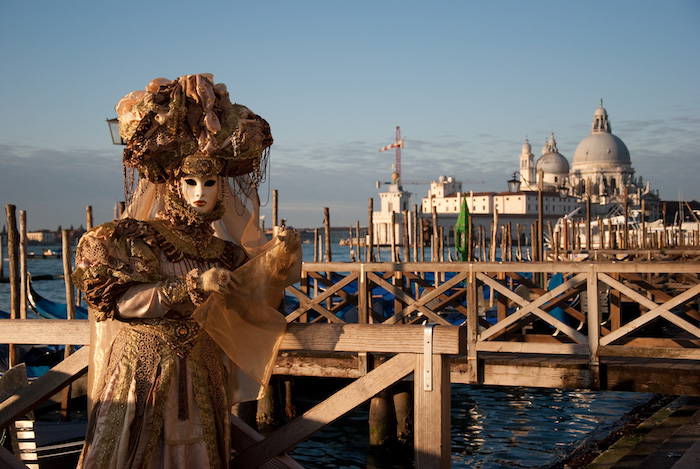
Heather Broster is a graduate with honours in linguistics from the University of Western Ontario. She is an aspiring polyglot, proficient in English and Italian, as well as Japanese, Welsh, and French to varying degrees of fluency. Originally from Toronto, Heather has resided in various countries, notably Italy for a period of six years. Her primary focus lies in the fields of language acquisition, education, and bilingual instruction.


